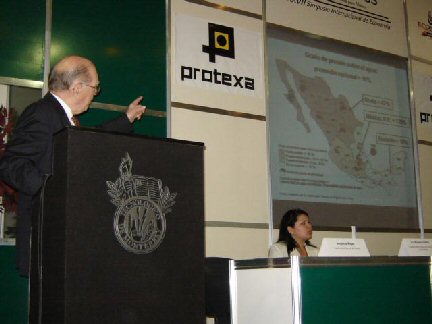|
|
From Volume 5, Issue Number 15 of EIR Online, Published Apr. 11, 2006 |
Latest From LaRoucheLaRouche Addresses Monterrey Forum on Global Crisis, SolutionsLyndon LaRouche met in Monterrey, Mexico on March 31 with a group of trade unionists, political figures, educators, subscribers to EIR, and others, some of whom came from as far away as the states of Sonora and Baja California in the north, and Queretaro and Mexico City in the south. Here is the transcript of his speech. The meeting was moderated by Benjamin Castro. I shall take up three subjects. First of all, a general review of the current world situation, as it affects this part of the world. Secondly, a crucial feature of our work which no one else in politics is doing. And thirdly, some important developments which are occurring in the organization of youth throughout South and Central America. The 'Post-Greenspan' EraFirst of all, what we're faced with immediately, you should understand, is an impending general collapse of the world monetary-financial system. It's nothing different, in a sense, than what I've been warning about as inevitable in this process. But we have reached a critical point, where, for example in Mexico, you may have a total collapse of the system before the Presidential elections. It may not happen at that time, but that potential is there, and it's developing very rapidly. Since 1987, the international monetary-financial system has depended upon a gigantic fraud. And the fraud is, that the collapse of the U.S. stock market in 1987, October '87—what happened then—was essentially the same thing as the 1929 collapse. So what happened at that point: Alan Greenspan, who was now about to replace Paul Volcker at the Federal Reserve System, told Volcker, "Wait, I'm going to fix this." What he did is, he legalized a form of transaction, which would have been considered criminal fraud in many cases. For example, Enron is a criminal fraud. And the entire world monetary system has been operating on the basis of a gigantic criminal fraud. This is called "hedge funds." It's called "financial derivatives." The whole thing is one gigantic bubble, which would embarrass John Law. The bubble goes in the order of magnitude of quadrillions of dollars equivalent, in a world where you're measuring total product in terms of less than $100 trillion. And therefore, the crash of this system would be the biggest financial crash in all history, not only in magnitude, but as a percentile of total listed assets. There's no way, in a financial crash, that the debts which are outstanding from financial derivatives can be bailed out. That does not mean that the economies have to crash, because, what you do if you have a true nation-state, the government takes over the banking and financial system in order to maintain the levels of employment, payment of pensions, and so forth. Then the government must create credit to launch legitimate growth. And that's the great issue before us.... |
|
| All rights reserved © 2006 EIRNS | |
